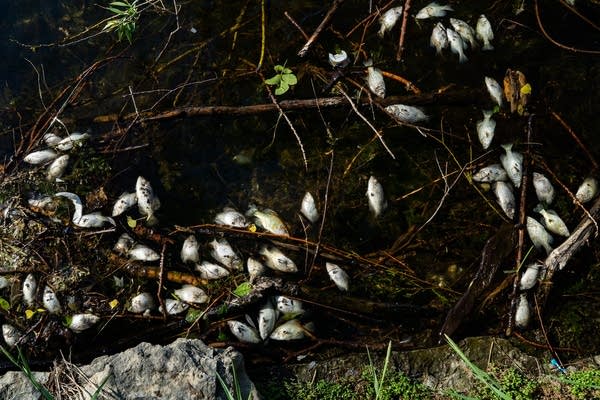Heat brings more reports of dead fish in Minnesota lakes

Go Deeper.
Create an account or log in to save stories.
Like this?
Thanks for liking this story! We have added it to a list of your favorite stories.
It's not uncommon for the Department of Natural Resources to get reports of large numbers of dead fish floating in Minnesota lakes in spring and summer.
But fish die-offs have been more frequent and widespread than usual, as temperatures soared to record highs in June across much of Minnesota.
The DNR has received a couple hundred reports of fish die-offs in the last three weeks from lakes all over the state involving significant numbers of fish, said Tom Burri, a limnology consultant for the DNR.
“It’s pretty broad in the state right now in the last few weeks,” he said. “And it is definitely more than we’ve seen, other than the 1998 drought.”
Turn Up Your Support
MPR News helps you turn down the noise and build shared understanding. Turn up your support for this public resource and keep trusted journalism accessible to all.
When lakes heat up, fish get stressed, and they're more vulnerable to deadly infections — either viral or bacterial, Burri said.
"We've had a long stretch of hot weather, and it's stressful for fish,” he said. “It opens these fish up for these opportunistic infections to get in the system more than they (already) are. And it leads to the mortality of these fish."
Climate change is likely a contributing factor as Minnesota lakes gradually get warmer, Burri said, increasing the stress on fish.
“Our most northern lakes in Minnesota also feel the heat, because those are some cold- or cool-water fish up there,” he said. “That rapid change in temperature stresses those fish out equally.”
Die-offs commonly affect multiple species, including carp, sunfish, crappies, perch, largemouth bass and northern pike, he said.
While infections have been the culprit behind the most recent wave of deaths, there can be other sources of fish kills, including the depletion of oxygen in a lake while it’s frozen, or a pollution spill.
Burri encourages people to report fish die-offs to the state duty officer by calling (800) 422-0798.
Providing information such as location, estimated number and size of fish and species is helpful, Burri said, as well as any obvious signs of a hazardous spill or other potential cause.
Dear reader,
Political debates with family or friends can get heated. But what if there was a way to handle them better?
You can learn how to have civil political conversations with our new e-book!
Download our free e-book, Talking Sense: Have Hard Political Conversations, Better, and learn how to talk without the tension.




